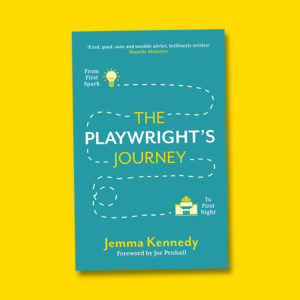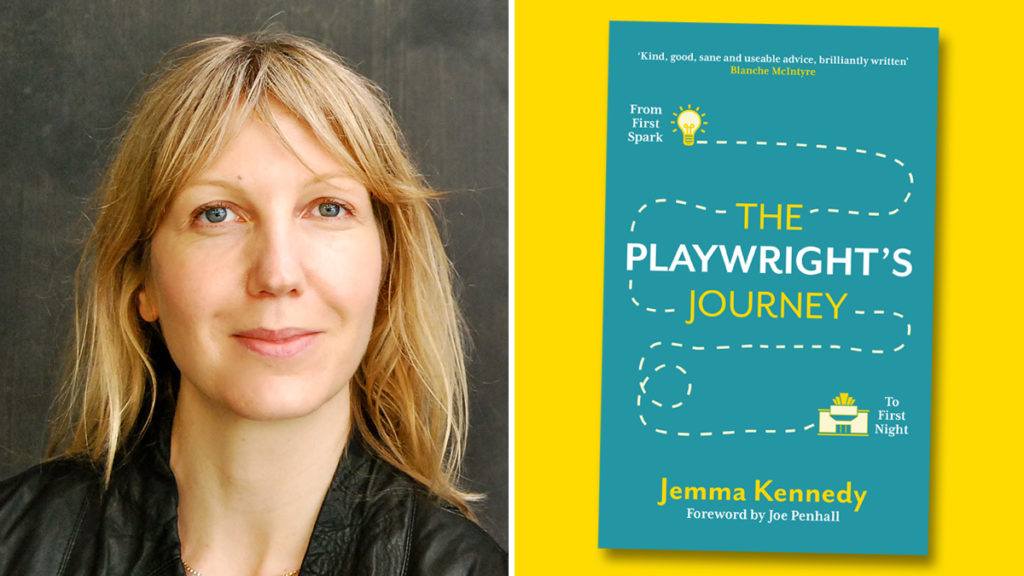We’re really excited to share an extract from the exciting new playwriting book by Jemma Kennedy, The Playwright’s Journey: From First Spark to First Night. In this extract, Jemma shares her thoughts on what playwrights can learn from working with actors. The book is available to buy now from Nick Hern Books (scroll down for an exclusive discount for London Playwrights readers!).
“For most theatre writers, seeing and hearing our words made flesh is a powerful and sometimes overwhelming experience. Suddenly our long-worried-over lines become spoken words. Our imaginary characters become real people. Our story skeletons acquire feathers and fur.
I have learned many valuable lessons along the way from actors, but most of them can be distilled into one very simple question, which I try to remember to ask whenever I’m creating a character, writing a line or forming a scene: What can an actor do with this? In other words, what of their craft and instinct can they bring to the play?
Regardless of the various existing schools of acting, the fundamental principles that actors learn in creating a character and performing a text are essentially the same. Here are few of the things I’ve learned.
Acting is far more than just speaking lines
Actors are trained to act with their bodies, not just their voices. They are acting when they are delivering dialogue, but also when they are not. Characters rarely all speak at once on stage – so it follows that they are always listening to each other. When you write, try to think beyond the single character talking at any one moment in your play. Visualise the other actors on stage around them. What are they doing? How are they feeling? What are they thinking? How are they listening? You don’t have to detail constant activity for every actor on stage – where actors stand, sit and move (otherwise known as ‘blocking’) will be worked out in rehearsal. But do try to develop a sense of the energetic relationship between your characters in physical time and space. If a scene or moment starts to feel static, think about how you might create a better flow of energy and pace in the spoken dialogue, which may in turn stimulate the characters on stage to respond physically.
Acting is more than just ‘imitation’
Actors are taught to look for ‘truth’ – to create a character in performance who is believable, autonomous and with an inner life. They are interested in mining real emotion, thought and behaviour in their character and presenting a truthful representation of a human being on stage. The clearer your characters’ psychology, personality and behaviour are on the page, the better the actors can honour your intentions, and the more
layers of detail they will be able to find. They will also try to fill in any gaps that you as the writer haven’t filled, often including a detailed backstory for their character. You don’t have to spell out a detailed history for each character in the play (unless it’s essential to understanding the plot), but if you can’t imagine one for them, it’s unlikely an actor will find it easy either. The better you know your characters, even if not all the information you’ve collected about them goes into the play, the better chance the actor has of representing them.
Characters exist on a continuum through time
We meet characters in particular locations and times, and in particular contexts and states of mind. Actors will think carefully about all the detailed elements in the text that might affect their character’s behaviour in a scene. They will also imagine others that you didn’t specify, such as where their characters were and what they were doing before they entered
the scene. Actors don’t just look at the few lines they speak in any part of the play, but consider their character’s place in the cosmology of the whole play and on a continuum of the character’s lived experience in and outside the play’s parameters. The more you ask yourself the same questions when writing, the more you can create nuanced behaviour and depth of character that a good actor will easily bring to life.
Dialogue is not just about what is said but how it is said
No two actors will ever read the same line in an identical way, but they will always look for clues in your characters’ vocabulary, idiom, tone and rhythmic patterns in order to help them interpret character. This also includes the use of pauses, beats, silences, hesitations, and so on. Everything you put on the page should be there for a reason. The actor will assume it is so – try not to disappoint them!
This is an edited extract from The Playwright’s Journey: From First Spark to First Night by Jemma Kennedy – out now, published by Nick Hern Books.
Jemma Kennedy is a playwright and screenwriter. Her work has been seen internationally, including at Hampstead Theatre and the National Theatre, London, where she has been both playwright-in-residence and teacher of playwriting.
 Want to get a copy of the book?
Want to get a copy of the book?
SPECIAL OFFER ON THE PLAYWRIGHT’S JOURNEY
Save 25% on Jemma Kennedy’s new book The Playwright’s Journey when you order your copy direct from publishers Nick Hern Books. To get your copy for just £11.24 plus delivery (RRP £14.99), head to www.nickhernbooks.co.uk/playwrights-journey and enter code JOURNEYLP25 at checkout. This offer is valid until 30 September 2022.

